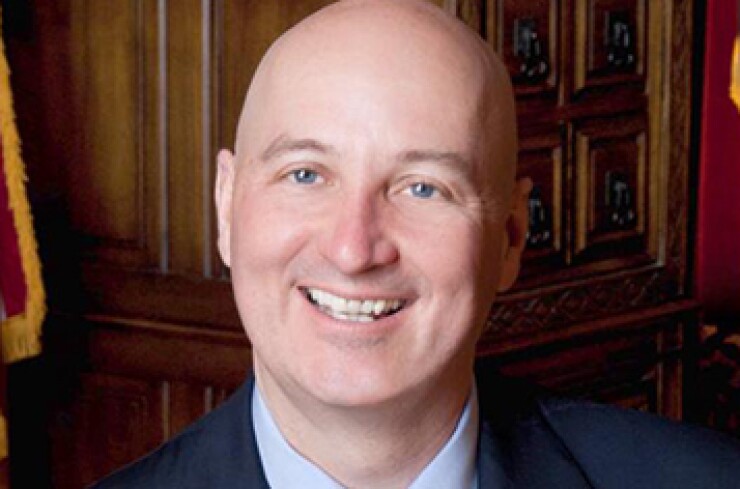
DALLAS – Most Nebraskans could see an income tax cut beginning in 2020 under a tax overhaul proposal Gov. Pete Ricketts announced Thursday.
The governor, who said the income tax reduction would be the first in 20 years, also proposed property tax changes.
Ricketts also laid out his plans to reduce spending in the state's biennium budget in order to close the gap on $900 million deficit projected over the next two years to meet his goal of balancing the state's books without raising taxes.
Ricketts' overall budget recommendations for the 2017-2019 biennium provide for two-year average growth in state appropriations of 1.7%. He recommends no tax increase and provides for a State Cash Reserve Fund with a $500 million unobligated balance.
Ricketts has also recommended recapturing about $77 million in unspent money from the budgets of agencies and offices.
He is also proposing specific reductions of $51 million and $42.4 million in across-the-board cuts, along with pulling $21.5 million from various cash funds with excess balances, and the $11.2 million in state taxes that are expected to be collected from Amazon.com sales in the next six months. The company began charging state taxes to Nebraska customers on Jan. 1.
The proposal leaves K-12 funding untouched for the remainder of the fiscal year, the governor said. State aid for public schools granted through the state's school funding formula totaled $1.2 billion in general funds and other revenue this year.
On his tax proposals, Ricketts said that for the state to remain competitive it must control spending without taxing citizens.
"Our high tax rate hampers our ability to grow over long term," Ricketts said. "If we want to outpace other Midwestern states, we have to be more competitive."
The state has a top income tax rate of 6.84% for individuals making $29,831 or more annually and to couples making $59,661 or more.
"Any single individual making $29,831 is caught in the highest tax bracket," Ricketts said. "Folks, $29,831 is not rich. It is middle class. Married couples making $59,661 are also caught in that tax bracket, and that's more than half of them."
Ricketts, with the support of Sen. Jim Smith of Papillion, chairman of the Legislature's Revenue Committee, will propose a gradual reduction in the top state income tax rate beginning in 2020 as long as state revenue growth exceeds 3.5% at the time.
The revenue growth requirement could help the state avoid troubles others like Kansas got into when revenues faltered after tax cuts. Missouri has enacted a future cut also based on the state meeting revenue growth targets.
The income tax plan would reduce the top rate by roughly one-tenth of 1% per year. The proposal would ultimately take the top rate down from 6.84% to under 6%.
Ricketts also said he will support legislation sponsored by Sen. Lydia Brasch of Bancroft, chairwoman of the Legislature's Agriculture Committee, to change the methodology of assessing property value from a market-based system to "an income-potential system."
Changing the property tax appraisal would slow the growth of agricultural land valuation increases beginning in 2019, said Ricketts. If the system were in place for 2017 it would reduce agricultural land valuations by about $2.2 billion.
"Property taxes are too high, especially for our agricultural producers," Ricketts said. "Income potential based property tax assessment for ag land is used in North Dakota, South Dakota, Kansas, Iowa, Wisconsin, Illinois, Indiana, and Ohio. This method is much fairer and standard across ag states, which is why many Nebraska ag producers have suggested it to me."
Ricketts said that "controlling spending" would be key to his overall tax reduction plan.
Earlier in the week Ricketts outlined his plan to deal with a $276 million deficit in the current budget to deal with the current state revenue shortfall tied to a dramatic decline in farm revenue.
"Farm income has gone from $7.5 billion a few years ago to $4.5 billion in 2015 and may have declined to about $4 billion last year," the governor said.
In July, Ricketts told his cabinet and state agencies to use fiscal restraint in crafting their budget requests. In October, he placed a freeze on non-mission-critical hires and a travel ban on non-essential out-of-state travel. Additionally, Nebraska's State Budget Office reduced allotments, or the amount of money made available to an agency, as well as carryover appropriations for state agencies.
Ricketts said that quick action will help ensure state agencies are able to manage their budgets and absorb these reductions.
He wants the Legislature's newly formed Appropriations Committee to make the tax changes a priority, and to get the recently introduced bills dealing with the budget to the full Legislature by the first week in February.
S&P Global Ratings assigns Nebraska an issuer credit rating of AAA. The state is not an active debt issuer as the state's constitution prohibits it from issuing general obligation bonds in excess of $100,000.





